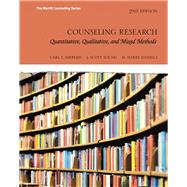Note: This is the bound book only and does not include access to MyEducationLab® with Pearson eText. To order MyEducationLab® with Pearson eText packaged with the bound book, use ISBN 0134442547.
Concise and lucid writing made this book in its first edition the leading research methods text written specifically for counselors.
The text introduces reader to the basics of how to do research–from formulating a problem, doing a literature review, selecting a design, collecting and analyzing data, through reporting results. It also provides readers with the information they need to become intelligent consumers of published research. Covering a broad range of quantitative, qualitative, and mixed methods designs, as well as action research and program evaluation, the text presents the most common types of research used in the field of counseling.
From reviews of the text:
“The content is strong and clearly explained. . . . This is the best [counseling research text] I have seen.”
–Monica Osburn, UNC-Pembroke and Webster
“The majority of my students report it is easy to follow and understand, even those with limited research knowledge. . . . So often I find counseling students viewing research methods courses as courses they must just ‘get through’ and not ones that will help them in their future careers. This book . . . does help students understand how this knowledge can benefit them in their future practice.
–Ryan Melton, Portland State University
“The book is very clear and concise, and it is an easy text for the students to understand. The many examples used throughout the text and sample paper are great resources for the students. . . . It is relevant to counseling students, it has information required by CACREP, and it is a comprehensive research textbook that is easy for students to follow. The examples given are superb . . . .”
–Lakitta D. Johnson, Jackson State University
Also available with MyEducationLab®
This title is also available with MyEducationLab--an online homework, tutorial, and assessment program designed to work with the text to engage students and improve results. Within its structured environment, students can practice what they learn, test their understanding, and receive feedback to guide their learning and ensure they master key learning outcomes.










